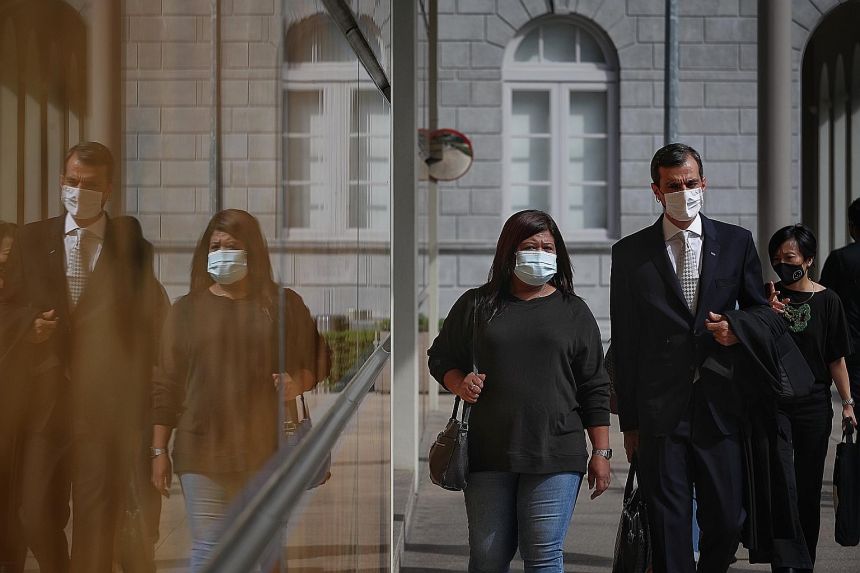High Court dismisses Parti Liyani's bid against AGC for $10,000 compensation
Sign up now: Get ST's newsletters delivered to your inbox

Ms Parti Liyani and her lawyer Anil Balchandani at the Supreme Court on Oct 27 last year.
PHOTO: ST FILE
Follow topic:
SINGAPORE - The High Court judge who acquitted former domestic worker Parti Liyani last year of stealing from her employer has dismissed her application seeking compensation of $10,000 from the Attorney-General's Chambers (AGC).
Justice Chan Seng Onn said on Monday (June 21) that Ms Parti has not succeeded in proving on a balance of probability that her prosecution was "frivolous or vexatious".
The judge said in a 102-page judgment: "The decision to bring the charges against Parti was based on sufficient evidence such that there is a case fit to bring before the court.
"Parti has not established at any time during the proceedings that there were any new developments such that her prosecution ought to have been immediately discontinued mid-way through the trial."
Ms Parti was originally accused of stealing more than $50,000 worth of items from the family of prominent businessman Liew Mun Leong.
She was found guilty by a district court of four theft charges and sentenced to 26 months in jail, but was acquitted by Justice Chan in September last year on appeal.
Ms Parti, who returned to Indonesia in January this year, then applied for compensation under Section 359 (3) of the Criminal Procedure Code - the first person here to do so.
The provision, which was introduced in 2010, states that if an accused is acquitted of any charge and if the court is satisfied that the prosecution was frivolous or vexatious, the court may order a compensation sum of up to $10,000.
She relied on assertions against the prosecutors' conduct of the proceedings, assertions against the sufficiency of evidence supporting the commencement and continuation of her prosecution, and assertions of malice or dishonesty.
However, Justice Chan said these assertions fail to meet the high threshold for establishing that Ms Parti's prosecution was frivolous or vexatious.
The main issue before the judge was the interpretation and scope of Section 359 (3).
He noted that in Singapore's criminal justice system, it is not the case that an acquitted person is entitled as of right to compensation.
The judge said the purpose of Section 359 (3) was to provide some redress for the legal wrong done to the acquitted person arising from a "frivolous or vexatious" prosecution.
"A prosecution that is brought or continued against an accused person in good faith and with sufficient evidence... does not become a 'frivolous or vexatious' prosecution simply because the prosecutor's conduct at the proceedings is unacceptable," he said.
The burden of proof lies on the applicant, he said.
Justice Chan said Ms Parti's dissatisfaction with the prosecutors' conduct did not render the prosecution frivolous or vexatious.
Among other things, the former domestic worker asserted that the prosecutors had "nitpicked" in cross-examination questions and failed to objectively value the items.
Justice Chan said: "This court is not the correct forum to air grievances about the manner the prosecution was conducted by the DPPs."
Any misconduct should be the subject of disciplinary proceedings, he added.
Justice Chan also accepted that the evidence of the Liew family and Ms Parti's own admission in her statements that she had taken some of the items were sufficient to justify the commencement of prosecution.
The judge said one charge was initially flawed due to a discrepancy regarding the date of the termination of Ms Parti's employment.
But this oversight did not negate the fact that there was sufficient evidence for an objective reasonable prosecutor to have considered the case fit to be tried before the court, he said.
Justice Chan noted that the rest of Ms Parti's assertions were based on the findings he had made in acquitting her. They included delays by the police in seizing the items in question.
"However, the inquiry as to whether the prosecution was frivolous or vexatious cannot be undertaken based on hindsight," he said.
Justice Chan also found that Ms Parti had not established her assertions of malice or dishonesty on the part of the prosecutors, based on their alleged withholding of evidence on the functionality of the Pioneer DVD player, which she had been accused of stealing.
He noted that the prosecutors are facing disciplinary proceedings on this point.
However, he said that even on the assumption that the prosecutors failed to disclose a defect in the functionality of the DVD player, this did not mean Ms Parti's prosecution was frivolous or vexatious.
This is because the functionality of the DVD player is related to only one aspect of one item in one of the four charges brought against her.
"This assertion does not undermine the evidential basis of Parti's prosecution which was Mr Liew's evidence that these items were his and had been stolen from him," said Justice Chan.
What happens next
A disciplinary inquiry into Ms Parti Liyani's complaint of misconduct against the two prosecutors who conducted her trial is scheduled to be heard in September.
Ms Parti filed an application in June last year to start disciplinary proceedings against deputy public prosecutors Tan Yanying and Tan Wee Hao.
Her complaint arose out of the manner in which she was cross-examined on the functionality of a DVD player she had been accused of stealing.
Ms Parti contended that at her district court trial in 2018, the prosecutors created the false impression that the player was fully functional during a demonstration of the device.
In October last year, Chief Justice Sundaresh Menon gave the green light for a disciplinary tribunal to be appointed to investigate the complaint.
Lawyers Peter Low and Choo Zheng Xi are acting for Ms Parti.
Ms Tan is represented by Senior Counsel Davinder Singh, while Mr Tan's lawyer is Senior Counsel Jason Chan.

